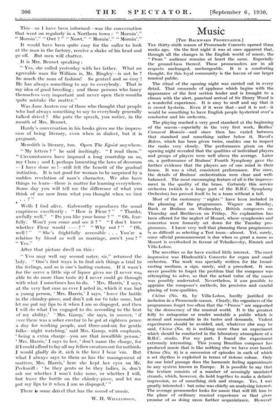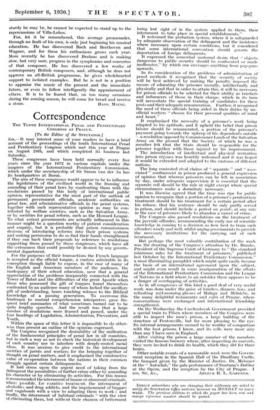Music
[THE BACKWARD PROMENADER.] THE thirty-sixth season of Promenade Concerts opened three weeks ago. On the first night it was at once apparent that, through all the changes in the English world of music, the "
Prom" audience remains at heart the same. Especially the ground-bass thereof. These promenaders are in all respects unchanged, unchangeable. It is a comforting thought, for this loyal community is the leaven of our larger musical public.
The ritual of the opening night was carried out in every detail. That crescendo of applause which begins with the appearance of the first section leader and iS brought to a climax with the alert, punctual arrival of Sir Henry Wood is a wonderful experience. It is easy to scoff and say that it is crowd hysteria. Even if it were that—and it is not—it would be something to have English people hysterical over a conductor and his orchestra.
The playing reached a very good standard at the beginning of the season—especially in the very first work, Berlioz' Carnaral Romain—and since then has varied between that standard and something rather below it. Ravel's Bolero, which has been given twice, enables one to inspect the ranks very closely. The performance given on the opening night revealed that the qualities of individual players and groups of players were well above the average. Later on, a performance of Brahms' Fourth Symphony gave the further evidence that the players are of one mind in their house. It was a vital, consistent performance. For once, the details of Brahms' orchestration were clear and well- balanced. The most encouraging feature of all is the improve- ment in the quality of the brass. Certainly this service orchestra (which is a large part of the B.B.C. Symphony Orchestra) has proved itself to be a team without a tail.
Most of the customary " nights " have been included in the planning of the programmes. Wagner on Monday, Bach or Brahms on Wednesday, British composers on Thursday and Beethoven on Friday. No explanation has been offered for the neglect of Mozart, whose symphonies and concertos were formerly set down for the Tuesday pro- grammes. I know very well that planning these programmes is as difficult as selecting a Test team—almost. Yet, surely, some official pronouncement is due when so great a name as Mozart is overlooked in favour of Tchaikovsky, Krenek and Villa-Lobos.
The novelties so far have excited little interest. The most impressive was Hindernith's Concerto for organ and small orchestra. The work was specially written for the broad- casting medium, a sign, surely, and a precedent. It was never possible to forget the problem that the composer was attempting to solve, so that the actual value of the music was possibly underrated. Nevertheless, it was possible to appraise the composer's methods, his precision and careful placing of tone-qualities.
Charos (No. 8), by Villa-Lobos, hardly justified its inclusion in a Promenade season. Clearly, the organizers of the programmes forget too often that the "Proms" are supported by the democracy of the musical world. It is the greatest folly to antagonize or render unstable a public which is normal and reasonable in its tastes and demands. Violent experiments should be avoided, and, whatever else may be said, Choros (No. 8) is nothing more than an experiment which should be conducted in the laboratory atmosphere of a B.B.C. studio. For my part, I found the experiment extremely interesting. This young Brazilian composer has produced music that is like nothing else we have ever heard. Cltoros (No. 8) is a succession of episodes in each of which a set rhythm is exploited in terms of riotous colour. Only for one brief passage does the harmonic feeling approximate to any system known in Europe. It .is possible to say that the texture consists of a number of seemingly unrelated strands, which, however, do hold together to make a definite impression, as of something rich and strange. Yes, I was greatly interested : but mine was chiefly an analysing interest. The average promenader looks for music that will lift him to the plane of ordinary musical experience or that . gives promise of so doing upon further acquaintance. However
sturdy he may be, he cannot be expected to stand up to the repercussions of Villa-Lobos.
For, let it be remembered, this average promenader, through no fault of his own, is only just beginning his musical education. He has discovered Bach and Beethoven and Wagner, and for these his enthusiasm grows each year. More recently he has discovered /3rahms and is making slow, but very sure, progress in the symphonies and concertos of that composer. Ile has discovered a few works of contemporary British composers, and, although he does not approve an all-British programme, he gives wholehearted support to isolated examples. But he is not in a position to appraise the music of the present and the immediate future, or even to follow intelligently the appraisement of others. It is to be feared that, on too many occasions during the coming season, he will come for bread and receive































 Previous page
Previous page